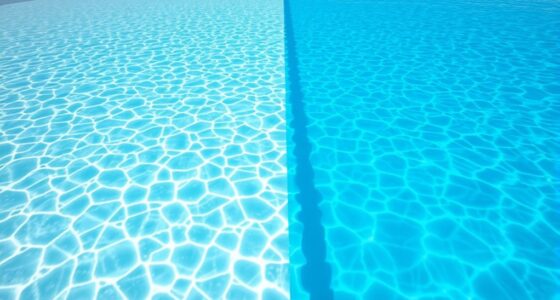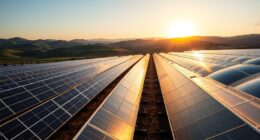Choosing the best way to heat your endless pool depends on your climate, budget, and eco goals. Heat pumps are cost-effective and energy-efficient in moderate climates, while gas heaters warm water quickly but cost more in the long run and have higher emissions. Solar systems are eco-friendly with minimal operating costs but need sunny weather and higher upfront investment. To learn which option fits you best, explore the details below.
Key Takeaways
- Heat pumps offer energy-efficient, quiet, and consistent heating suitable for moderate climates, with low operating costs and minimal maintenance.
- Gas heaters provide rapid heating and lower upfront costs but have higher long-term expenses and environmental impact.
- Solar systems are eco-friendly, cost-effective over time, and ideal in sunny regions, though they require high initial investment and depend on sunlight.
- Consider climate, energy costs, and environmental impact when choosing, as each system performs differently based on regional conditions.
- Proper installation and regular maintenance prolong system lifespan, maximize efficiency, and ensure reliable pool heating.
How Heat Pumps Work and Their Benefits for Endless Pools
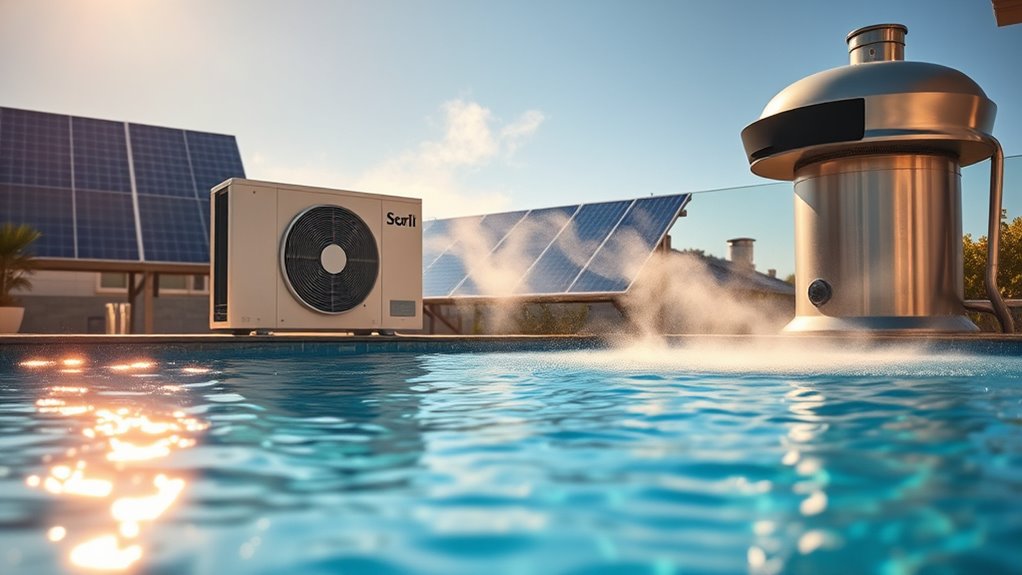
Heat pumps are an efficient way to heat your Endless Pool by transferring heat from the outside air into the water. They work by using a compressor and refrigerant to absorb heat from the air, then compressing it to a higher temperature before releasing it into the pool. This process allows you to heat your pool effectively even in cooler weather. One major benefit is their energy efficiency; they use less electricity compared to traditional electric heaters, saving you money over time. Heat pumps also operate quietly, so they won’t disturb your relaxation. Additionally, they provide consistent, even heating, making your swimming experience comfortable year-round. Overall, heat pumps are a smart choice for efficient, cost-effective pool heating. Implementing them can also help you meet your financial goals by reducing ongoing energy costs.
The Advantages and Disadvantages of Gas Heaters

Gas heaters can quickly warm your Endless Pool, making them a popular choice for rapid heating needs. They’re effective at raising water temperatures fast, so you won’t have to wait long to enjoy a comfortable swim. Gas heaters are also generally more affordable upfront compared to heat pumps or solar systems, making them appealing for budget-conscious owners. However, they produce emissions, so they’re less eco-friendly and can contribute to air pollution. Operating costs can be higher, especially if gas prices increase. They also require proper ventilation to prevent dangerous buildup of fumes, which can add to installation complexity. While great for quick heating, gas heaters may not be the best long-term option if you’re focused on sustainability and reducing your carbon footprint. According to research, environmental impact is an important factor to consider when choosing a heating system.
Solar Heating Systems: An Eco-Friendly Option
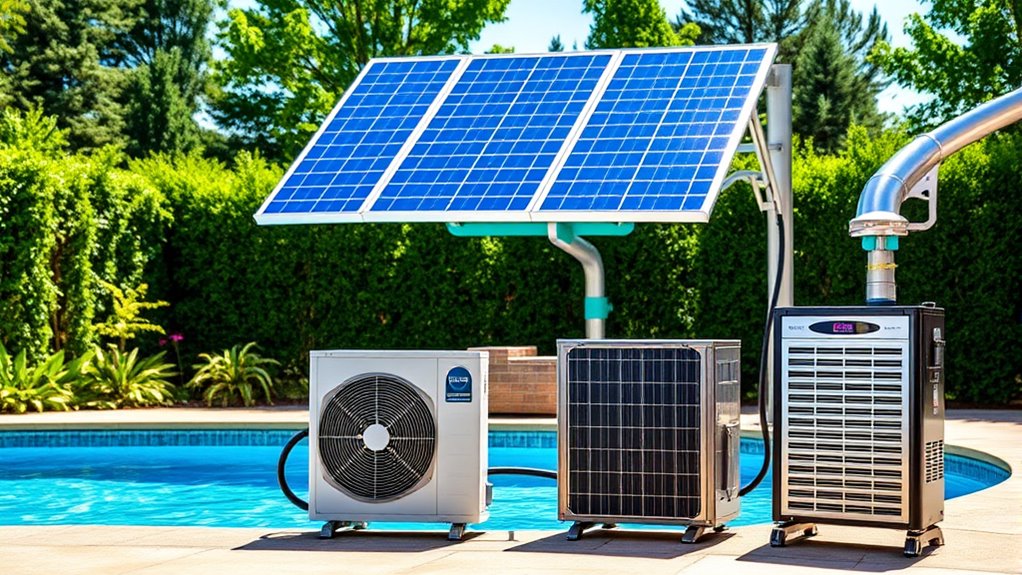
Solar heating systems offer a highly eco-friendly way to warm your Endless Pool by harnessing renewable energy from the sun. They use solar collectors to capture sunlight and convert it into heat, which then warms your pool water. This method reduces your carbon footprint and lowers energy bills over time. Plus, solar systems are low maintenance and quiet, making them a hassle-free option. You’ll also appreciate that they work well in sunny climates and can be integrated with existing pool equipment. While initial setup costs can be higher, federal incentives and decreasing panel prices make solar an attractive long-term investment. Additionally, solar energy is a renewable resource that helps reduce reliance on fossil fuels. With solar, you’re harnessing a clean, sustainable energy source that helps protect the environment and keeps your pool comfortably warm.
Cost Comparison: Installation and Operating Expenses
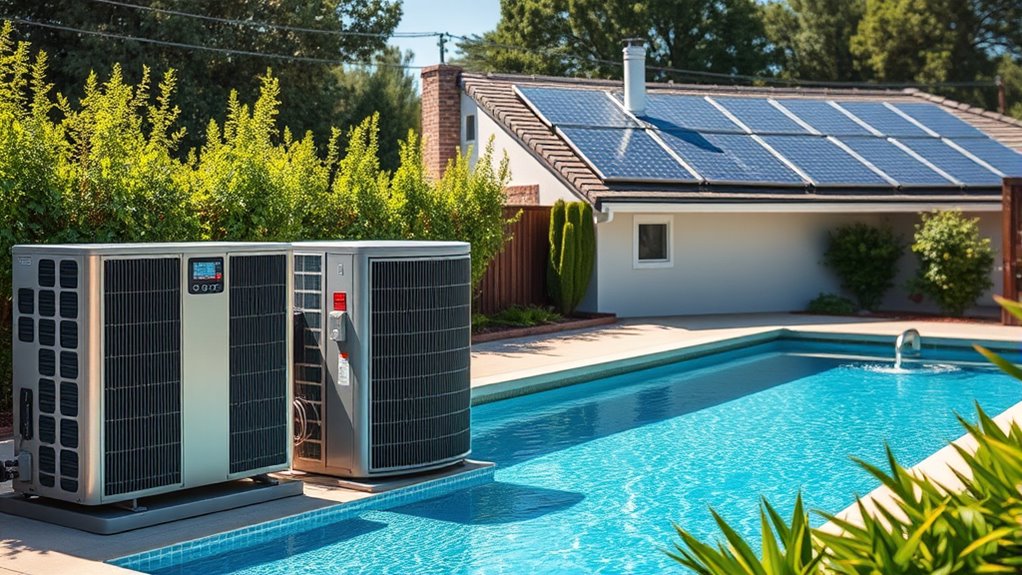
When comparing the costs of different heating options for your Endless Pool, it’s important to contemplate both installation and ongoing expenses. Heat pumps typically have higher upfront costs but lower operating expenses, thanks to energy efficiency. Gas heaters usually cost less to install but can be expensive to run over time, especially with fluctuating fuel prices. Solar systems require a significant initial investment and installation, but their operating costs are minimal once set up, as they harness free solar energy. Maintenance costs vary: heat pumps and gas heaters need regular servicing, while solar setups generally require less upkeep. Overall, your choice depends on your budget, energy prices in your area, and how long you plan to use the pool each year. Incorporating sound design techniques can help optimize the efficiency and user experience of your heating system setup.
Climate Considerations and Regional Suitability
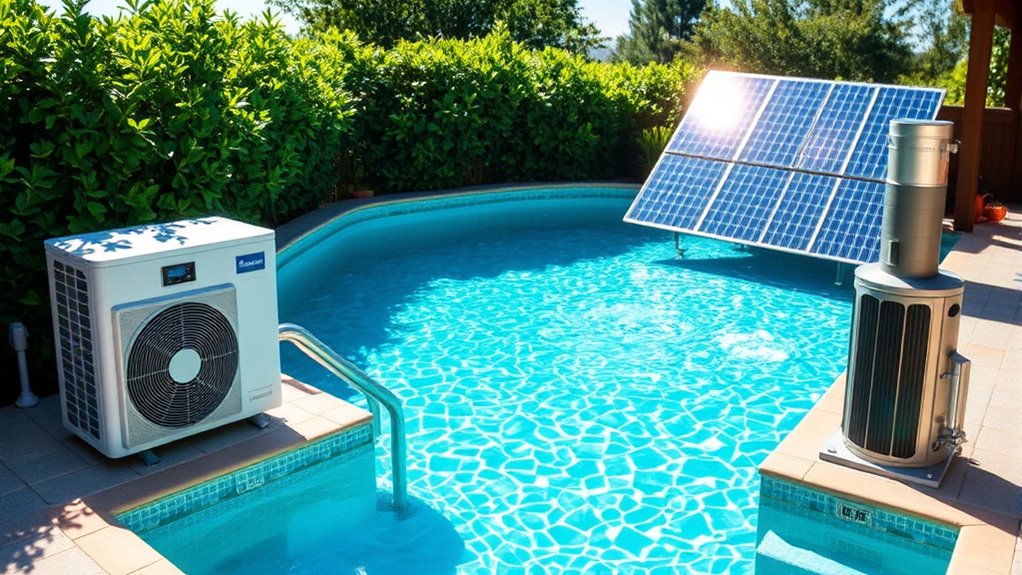
The effectiveness of your chosen heating system depends heavily on the climate and regional conditions where your pool is located. If you live in a colder region, gas heaters or solar might struggle to maintain consistent temperatures. Conversely, in milder climates, heat pumps perform efficiently without excessive energy use. Your location also impacts solar viability—more sunlight means better solar heating potential. Windy areas can reduce solar panel efficiency and increase heat loss. Humidity levels influence heat pump performance, as high humidity can hinder heat extraction. Consider local energy costs, availability of fuels, and regional weather patterns to determine the best option for your pool. Tailoring your choice to your environment guarantees reliable, cost-effective heating year-round. Additionally, understanding bad lemon juice signs can help maintain optimal pool chemical balance and prevent issues with water quality.
Energy Efficiency and Environmental Impact
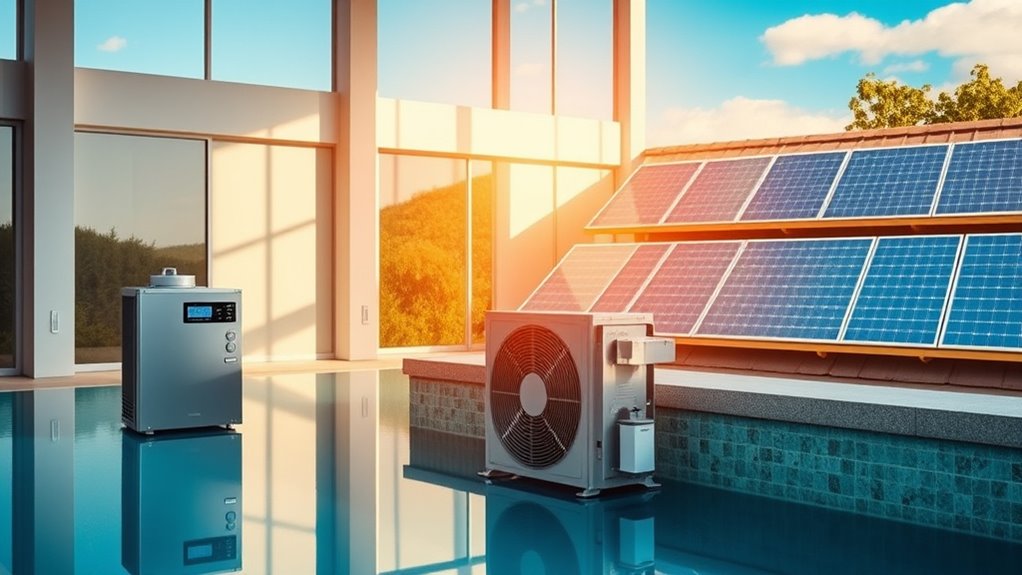
Choosing energy-efficient options can considerably lower your carbon footprint and save you money over time. Renewable energy sources like solar and heat pumps offer clear emission reduction advantages compared to traditional gas systems. By prioritizing these technologies, you help protect the environment while boosting your home’s efficiency. Additionally, incorporating solar-powered attic fans can improve ventilation and further reduce reliance on conventional cooling methods.
Renewable Energy Benefits
Are you aware of how renewable energy sources can boost your home’s energy efficiency while reducing environmental impact? Using solar or wind power for your pool heating not only cuts your utility bills but also minimizes your carbon footprint. These sources tend to be more sustainable and produce fewer greenhouse gases than traditional fossil fuels. By choosing renewables, you support cleaner air and a healthier planet. Plus, renewable systems often qualify for incentives or tax credits, making them more affordable. They also tend to require less maintenance over time, saving you money and hassle. Incorporating renewable energy into your pool heating means you’re making a smart, eco-friendly choice that benefits both your wallet and the environment. Gold IRA Rollovers can also be a smart addition to your overall financial plan for long-term security.
Emission Reduction Advantages
Since energy efficiency directly impacts both your utility costs and the environment, opting for renewable energy sources like solar, wind, or heat pumps can considerably reduce greenhouse gas emissions. These systems use less electricity or fuel, producing fewer pollutants and lowering your carbon footprint. Heat pumps, in particular, are highly efficient because they transfer heat rather than generate it, reducing energy consumption. Solar-powered systems harness sunlight, generating clean energy without emissions. Gas heaters, however, emit greenhouse gases during operation, contributing to climate change. By choosing eco-friendly options, you help decrease the amount of harmful gases released into the atmosphere, supporting a healthier planet. Improving your pool’s energy efficiency not only saves money but also aligns your lifestyle with sustainable practices. Proper system installation and maintenance ensure optimal performance and longevity of your energy-efficient heating solutions.
Maintenance Needs and Longevity of Each System
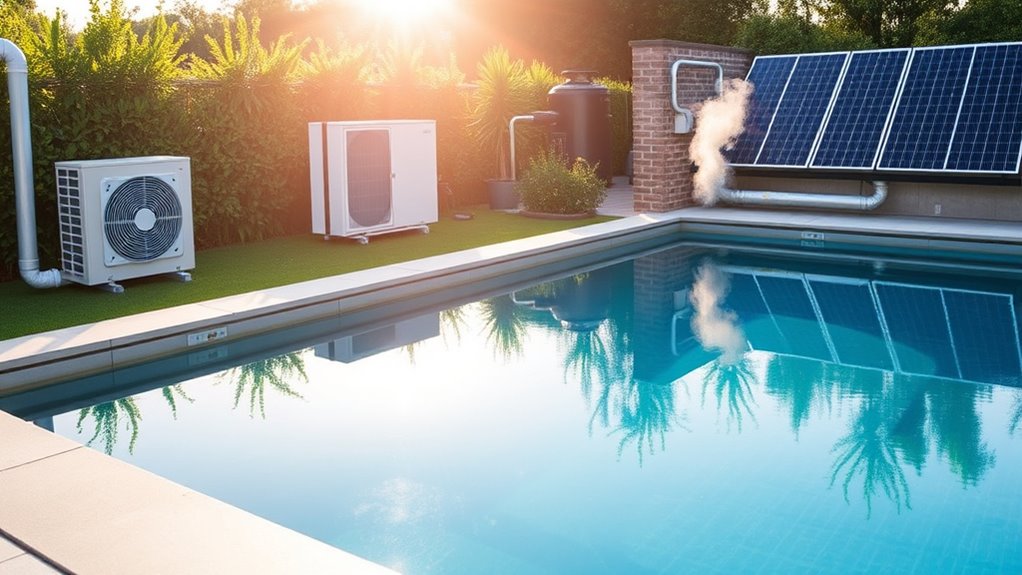
When it comes to maintenance needs and longevity, each heating system offers a different profile. Heat pumps generally require minimal upkeep, with annual filter replacements and occasional coil cleaning. Gas systems need regular inspections for leaks, burner adjustments, and vent cleaning to stay efficient. Solar systems are low-maintenance but need periodic checks on panels and inverter performance. Additionally, the increasing reliance on AI-powered safety measures in system monitoring can help prevent failures and extend lifespan.
Different heating systems vary in maintenance needs and lifespan, from low-maintenance solar panels to longer-lasting gas and heat pump systems.
- Heat pumps usually last 10-15 years with proper care
- Gas systems can reach 15-20 years but may need more frequent repairs
- Solar panels typically last 25-30 years, with inverter replacements every 10-15 years
- Regular maintenance extends system lifespan and keeps efficiency high
- Neglecting upkeep can shorten system longevity and increase costs
Choosing the Right Heating Method for Your Lifestyle
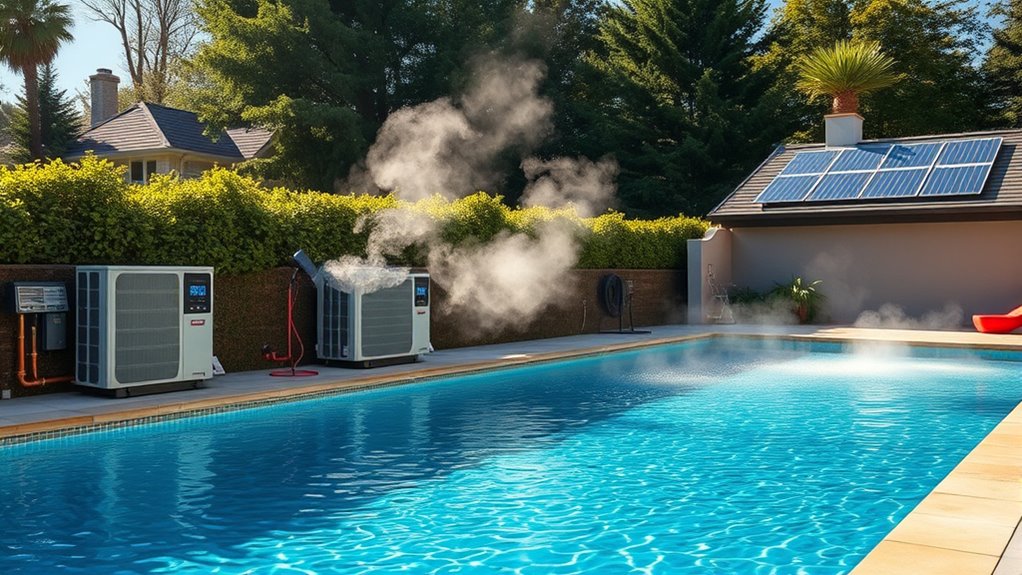
Choosing the right heating method depends on your lifestyle, energy preferences, and budget. If you value eco-friendliness and have ample sunlight, solar heating could be ideal, reducing ongoing costs. If you prefer quick, reliable warmth and don’t mind higher energy bills, gas heaters offer fast performance. Heat pumps strike a balance, providing efficient heating with lower operating costs, especially in moderate climates. Consider how often you use your pool; frequent use justifies investing in more efficient, long-term solutions. Your budget also plays a role—solar may have high upfront costs but saves money over time, while gas systems are typically cheaper initially. Think about your comfort priorities and the climate in your area to select the method that best fits your lifestyle and financial situation. Additionally, understanding nutritional advantages of green juice can help you incorporate healthier options into your routine to support overall wellness.
Tips for Maximizing Heating Performance and Savings
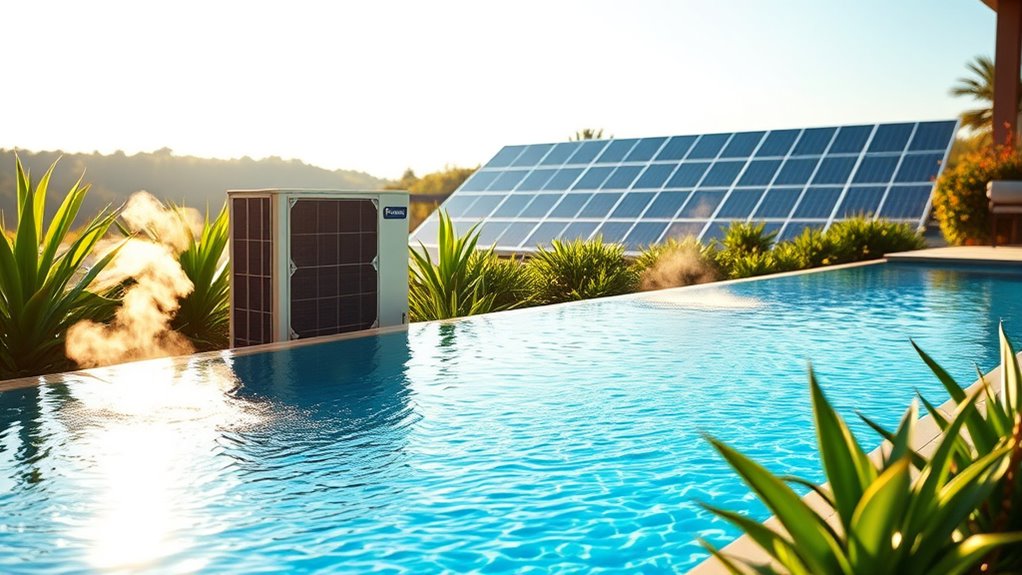
Maximizing your heating system’s performance and savings starts with proper maintenance and smart usage. Regularly clean filters, check for leaks, and schedule professional inspections to keep your system running efficiently. Use a timer or thermostat to avoid unnecessary heating when the pool isn’t in use. Insulate your pool and pipes to retain heat better and reduce energy waste. Keep an eye on weather forecasts; adjust settings during cold snaps to prevent overworking your system.
- Clean filters monthly to ensure ideal airflow
- Insulate pipes and pool edges for heat retention
- Use a timer to control heating times effectively
- Regularly check for leaks or drafts
- Adjust thermostat settings based on weather conditions
Frequently Asked Questions
How Quickly Can Each Heating Method Warm up the Pool?
It depends on the heating method you choose. Gas heaters warm your pool the fastest, often raising temperature in a matter of hours. Heat pumps take a bit longer, usually a day or so, but are energy-efficient. Solar heaters warm your pool gradually, often over several days, depending on sunlight and weather. If you need quick results, gas is best; for efficiency, consider heat pumps or solar.
Are There Hybrid Systems Combining Heat Pumps and Solar Options?
Imagine the perfect summer day—now, picture combining the best of both worlds. Yes, hybrid systems with heat pumps and solar options exist, blending efficiency and sustainability. You get quicker heating from heat pumps plus eco-friendly solar power, reducing costs and environmental impact. This smart combo adapts to your needs, providing consistent warmth while maximizing energy savings. It’s like having a reliable partner that works tirelessly to keep your pool inviting all year long.
What Safety Precautions Are Necessary for Gas and Solar Pool Heaters?
You should guarantee proper ventilation when using gas heaters to prevent dangerous carbon monoxide buildup. Regularly inspect and maintain solar panels to avoid leaks or damage, and keep electrical components weatherproofed. Always follow manufacturer instructions for installation and operation. Keep a fire extinguisher nearby when handling gas equipment, and consider professional installation for both systems to ensure safety standards are met. Regular safety checks help prevent accidents and ensure efficient operation.
How Do Outdoor Temperatures Affect Solar Heating Efficiency?
Imagine your solar panels sunbathing in a chilly breeze—outdoor temps drop, and so does their efficiency. When temperatures fall below 50°F, solar heating struggles to absorb enough warmth, leaving your pool feeling more like a winter pond. Conversely, on hot, sunny days, they thrive, soaking up sunbeams like a cat in a patch of sunlight. So, colder weather markedly reduces solar heating’s effectiveness, making your pool less inviting.
Can These Heating Systems Be Automated for Remote Control?
Yes, these heating systems can be automated for remote control. You can easily set up smart controllers or Wi-Fi-enabled thermostats that allow you to adjust temperatures, turn the system on or off, and monitor performance from anywhere via your smartphone or tablet. This convenience helps you maintain a comfortable pool environment effortlessly, saving energy and ensuring your pool is always ready when you want to swim.
Conclusion
Choosing the right heating method for your endless pool depends on your climate, budget, and eco goals. Will you embrace the quiet efficiency of a heat pump, the robust power of gas, or the green promise of solar? Remember, each option has its trade-offs — like a puzzle waiting to be solved. Ultimately, your decision shapes not just your pool’s comfort, but your impact on the planet. So, which piece fits your perfect picture?





